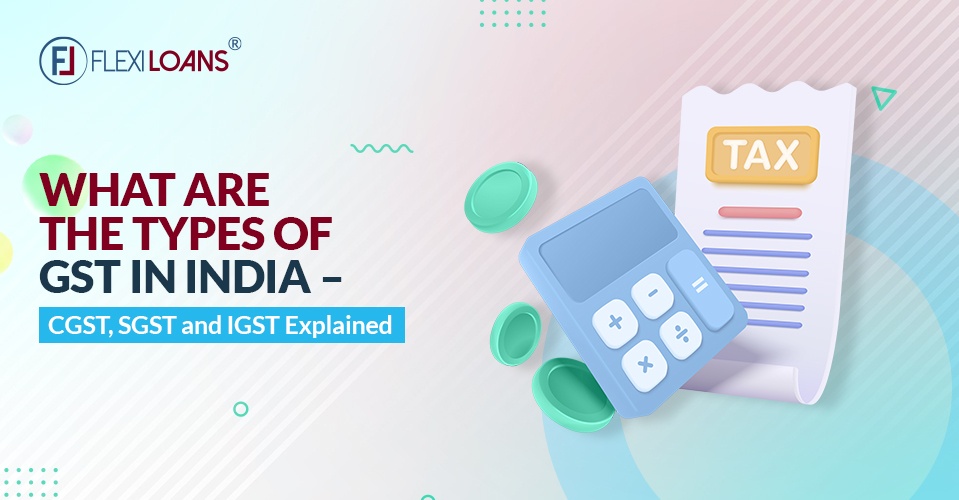Types of GST in India – What is CGST, SGST & IGST
May 24, 2023

The Goods and Service Tax (GST) is a significant tax introduced in India, and there are three types: CGST, SGST, and IGST. Knowing each type of GST is essential for businesses to calculate their tax liabilities and plan finances. Registering for GST also provides access to loans based on the GST returns filed, with government incentives.
FlexiLoans offers customised loans for businesses’ specific funding needs, leading to efficient financial management and steady business growth. This guide explains the features, applicability, and revenue distribution of each type of GST as well as how they impact loans and interest rates.
Differences Between GST Types at a Glance
| Types of GST | Authority Benefited | Priority of Tax Credit Use | Who Collects it | Transactions Applicable | Typical Rates |
| CGST (Central Goods and Services Tax) | Central Government | 1st | Central Government | Intra-state (within the same state) | Typically half of the combined GST rate (5%, 12%, 18%, 28%) |
| SGST (State Goods and Services Tax) | State Government | 2nd | Central Government | Intra-state (within the same state) | Typically half of the combined GST rate (5%, 12%, 18%, 28%) |
| IGST (Integrated Goods and Services Tax) | Central and State Government | 3rd | Central Government | Inter-state (between different states), and Import-Export | Typically half of the combined GST rate (5%, 12%, 18%, 28%) |
What is CGST?
The full form of CGST is Central Goods and Services Tax. CGST is a tax levied by the central government on intrastate transactions of goods and services in India, sharing the total GST with state-level taxes. When you apply for a loan for a company, the tax liability overall includes the CGST component. Understanding the CGST rate helps you calculate the loan interest rate more accurately.
Features
- The central government levies CGST on the intrastate movement of goods and services, impacting the eligibility for a business loan when assessing tax liabilities.
- CGST applies throughout India, except for Jammu and Kashmir, which has its own GST regime.
- CGST rates are the same across all states and union territories in India, promoting fairness and consistency in the tax structure.
- For intra-state transactions, both CGST and SGST are applicable. The central government collects the revenue generated through CGST.
- In most cases, the state and central government divide the total tax liability equally between the two, which plays a role in determining the business growth and economy in many states. This gives rise to the need for funding for many MSME owners like small business loans.
| Goods | CGST % |
| Household items like tea, coffee, edible oil, sugar, and spices, life-saving medicines, Indian sweets, and coal | 2.5 |
| Computer products and processed foods | 6 |
| Capital products, hair oils, toothpaste, soaps, and industrial goods | 9 |
| ACs, motorcycles, refrigerators, luxury items | 14 |
What is SGST?
The full form of SGST is State Goods and Services Tax.
Respective state governments collect and distribute the State Goods and Services Tax (SGST) as a component, in addition to CGST, on intra-state transactions. Before applying for a business loan, it’s crucial to factor in SGST, as it affects your expenses and overall profit and loss. This consideration will influence your repayment plan and ability to make timely payments.
Features
- SGST applies throughout India, except for Jammu and Kashmir, which has its own GST regime.
- For intra-state transactions, both SGST and CGST are applicable. It’s essential to consider both taxes when assessing the overall tax liability to determine your eligibility for a business loan accurately.
- In most cases, the state and central government share the tax liability equally. It’s essential to consider the tax liability when calculating the business loan interest rate, tenure, and EMI to avoid any financial burden in the future.
- The GST Council is responsible for determining the tax rates for both CGST and SGST.
- The state and central governments usually share the tax liability equally in most cases. Businesses can also assess their tax liability by using the business loan EMI calculator to estimate their monthly instalments, interest rates, and tenure, facilitating better financial planning.
| Goods | SGST % |
| Household amenities like tea, sugar, etc. Medicines, coal, and Indian sweets | 2.5 |
| Processed food items like cheese and bread. Computers and laptops also fall under this category | 6 |
| Capital products, hair oils, toothpaste, soaps | 9 |
| ACs, motorcycles, refrigerators, luxury items | 14 |
What is IGST?
The full form of IGST is Integrated Goods and Services Tax
The central government levies Integrated Goods and Services Tax (IGST) on the inter-state transactions of goods and services in India, and shares it among the states. To calculate the total cost of borrowing, businesses applying for an MSME business loan need to understand the IGST rates.
IGST can also impact the eligibility for a loan and the interest rate charged. Businesses can evaluate their repayment capacity before applying for a loan by utilising an EMI calculator for business loans.
Features
- IGST applies to all transactions of goods and services between two different states in India. The government levies this tax on the movement of goods and services across state borders.
- IGST is the only tax levied on inter-state transactions and includes both CGST and SGST.
- The central government collects the IGST revenue and then distributes it to the destination state.
- All states in India share the revenue generated by IGST, promoting ease of doing business across the country.
- The total tax payable on inter-state transactions is equal to the IGST rate. To estimate the tax payable and plan finances accordingly, businesses can use a business loan interest calculator that considers different GST types.
- The IGST rate is typically equal to the sum of CGST and SGST rates.
| Goods | IGST % |
| Household items like tea, coffee, edible oil, sugar, and spices, life-saving medicines, Indian sweets, and coal | 5 |
| Computer products and processed foods | 12 |
| Capital products, hair oils, toothpaste, soaps, and industrial goods | 18 |
| Luxury items, tobacco products, and aerated drinks | 28 |
What is the Purpose of GST?
-
Streamlining Multiple Taxes:
- The Central and State governments imposed various taxes before the implementation of GST.
- This often led to a complex and confusing tax structure.
-
Standardising Tax Regulations:
- Prior to GST, each State government had its own distinct set of tax rules and regulations.
- This inconsistency in tax systems across states led to complications in compliance and administration.
-
Addressing Inter-State Transactions:
- The Central government used to impose Central State Tax on transactions between states.
- This additional tax burden often discouraged inter-state trade and commerce.
-
Boosting Internal Trade:
- The lack of uniformity in the tax structure, and overlapping of taxes at the State and Central level (also known as tax cascading), significantly hampered internal trade.
- The introduction of GST aimed to alleviate this by creating a more coherent and unified tax system.
Benefits of Applying for a GST Business Loan
- Quick Access to Funds: Lenders process GST business loans faster than traditional loans.
-
Government Incentives: The government offers several incentives for businesses to promote entrepreneurship and self-employment.
Examples are Mudra Loan Scheme, Stand-Up India Scheme, Credit Guarantee Fund Scheme for Micro and Small Enterprises (CGTMSE), Startup India Scheme, and Atmanirbhar Bharat Abhiyan. - Lower Interest Rates: GST business loans come with lower interest rates compared to traditional loans, enabling businesses to save on interest expenses.
- Easy Repayment: GST business loans come with flexible repayment options, enabling businesses to choose a repayment schedule that suits their cash flow and business needs.
- Boosts Credit Score: Timely repayment of GST business loans can help businesses build a positive credit score, enabling them to access larger loans in the future.
- Helps with Tax Compliance: GST business loans can help businesses meet their tax compliance obligations and avoid penalties
Why Apply for a GST Business Loan with FlexiLoans
As a business owner, securing the right financing is crucial for the growth and success of your venture. Here’s why you should choose FlexiLoans:
- With FlexiLoans, you can apply for a GST small business loan online by submitting minimal documentation, reducing the hassle associated with traditional loan applications.
- With FlexiLoans, you don’t have to worry about providing collateral to secure loans. Our unsecured business loan options ensure that you can focus on growing your business without the stress of arranging collateral.
- FlexiLoans understands that every business has unique requirements, which is why we offer flexible term loan tenures ranging from 6 months to 36 months.
- Whether you need working capital loans, funds for inventory management, or expanding your operations, we have a loan product tailored to meet your needs.
- At FlexiLoans we provide our customers with competitive business loan interest rates, ensuring quick access to the funds you need without worrying about excessive financial burden.
- An innovative credit evaluation process ensures that we maintain high loan approval rates.
- At FlexiLoans, we understand that applying for a business loan can be confusing, especially with the complexities of GST involved. Our team of dedicated experts is available to guide you through the process.
Documents Required For GST Business Loans
| Document Type | Requirements |
| Personal KYC | PAN card |
| Residential Address Proof (Any One) | Rent Agreement, Driving Licence, Voter’s ID, Ration Card, Passport, or Aadhaar Card |
| Banking | Last 6 months’ current account bank statements |
| Business KYC (Any One) | GST Registration Certificate, Shops & Establishment Certificate, or Business PAN Card |
GST Business Loan Eligibility Criteria
| Minimum Business Vintage | 1 year |
| Monthly Business Sales Minimum | Rs. 2,00,000 |
Empower Your Business with FlexiLoans
In conclusion, understanding the different types of GST in India is essential for businesses to accurately calculate their tax liabilities, evaluate their eligibility for financing, and plan their finances accordingly.
With FlexiLoans, businesses can access a range of customised GST loan options tailored to meet their specific funding needs. Our hassle-free application process, flexible loan tenure, competitive interest rates, and high loan approval rates make us the ideal partner for businesses looking to grow and expand their operations. Plus, our expert team is available to guide you through the process and answer any questions you may have. Apply for a business loan online today to learn more about our loan options and take the first step toward achieving your business goals.
FAQ
Q. 1 Is GST applicable on a business loan?
Ans: GST is not directly applicable on loans for business. However, banks and lenders charge GST on the various services they offer while disbursing loans.
Q. 2 What is the total GST amount on a business loan?
Ans: A GST of 18% is applicable on business loan processing charges, which typically range from 2-3%.
Q. 3 Is GST mandatory for bank loans?
Ans: A business can set up a current account with a bank without a GST registration, but registering for GST provides them with an identification number, also known as GSTIN. It is advisable to register for GST to avail of its benefits, such as input tax credit and legal compliance.
Q. 4 What is the GST exemption for businesses?
Ans: Small businesses with an annual turnover of up to Rs. 40 lakhs can avail of a GST exemption. Businesses with a turnover of up to Rs. 1.5 crores can opt for the composition scheme under GST, which has been designed to make the taxation process simpler as well as to reduce the tax burdens of small firms.
Q. 5 What is the limit of GST payable?
Ans: Service providers must register for GST if their aggregate turnover exceeds Rs. 20 lakhs for normal category states and Rs. 10 lakhs for special category states.
Q. 6 Can entrepreneurs take GST business loans for start-ups?
Ans: Entrepreneurs with an established business and customer base can take advantage of these loans to expand their operations, as the government offers incentives and fast proessing of these loans.
Q. 7 What purposes can I take a loan for via FlexiLoans?
Ans: At FlexiLoans, we offer loans for various business purposes such as expansion, managing seasonal working capital requirements, servicing regular working capital needs, and addressing short-term cash flow gaps.
Read More:
Advantages and Disadvantages of GST in India
Checklist of Documents Needed for GST Registration









